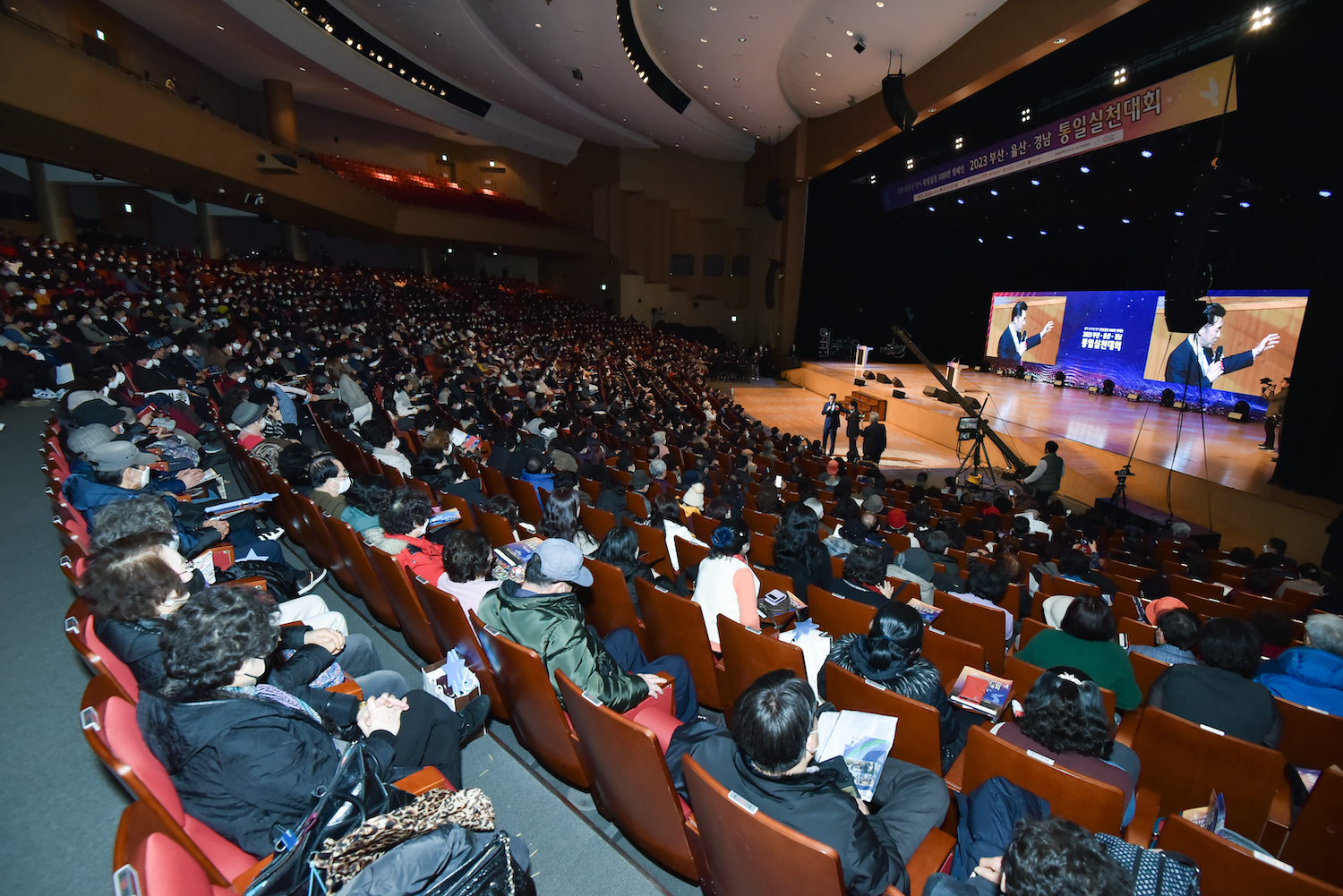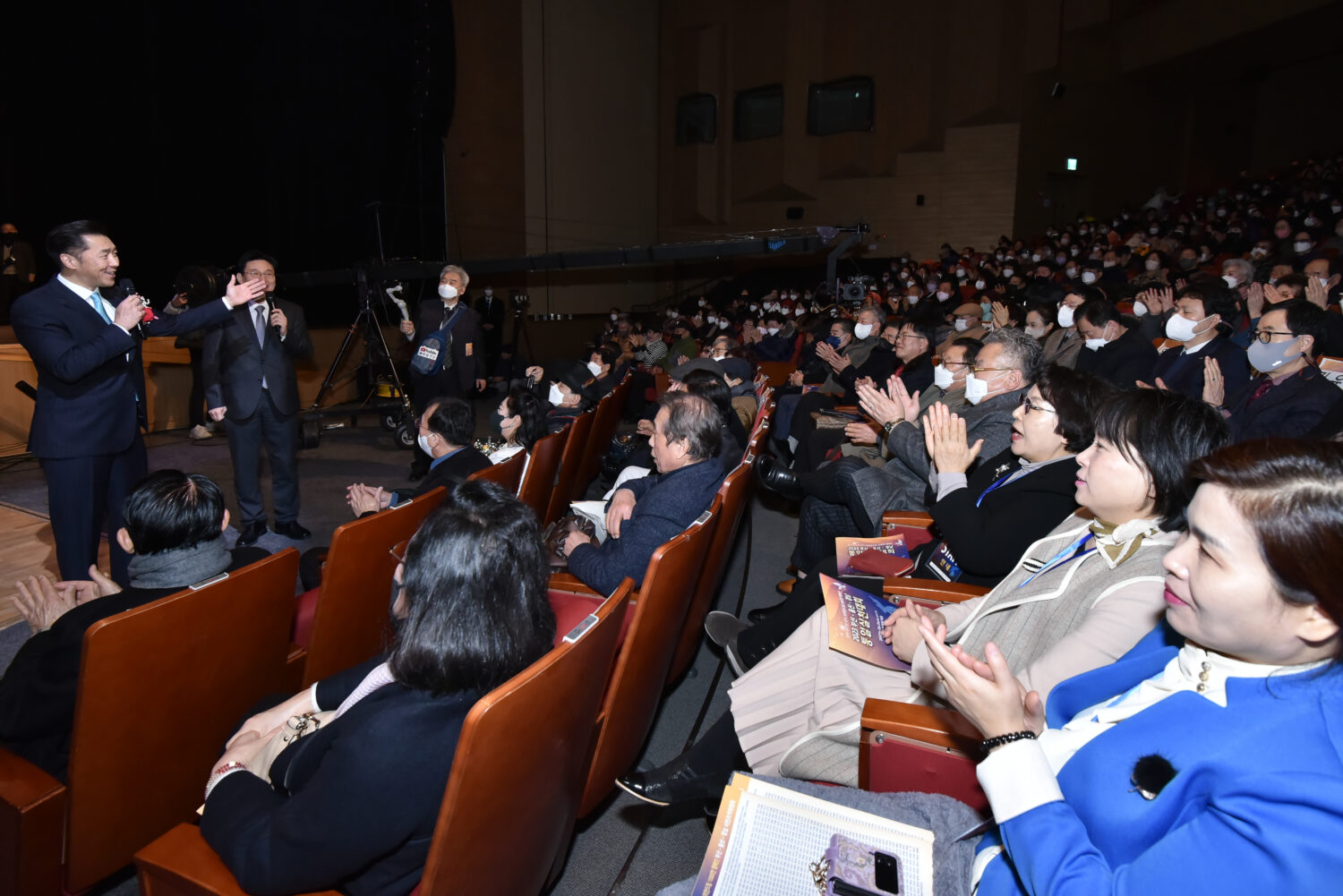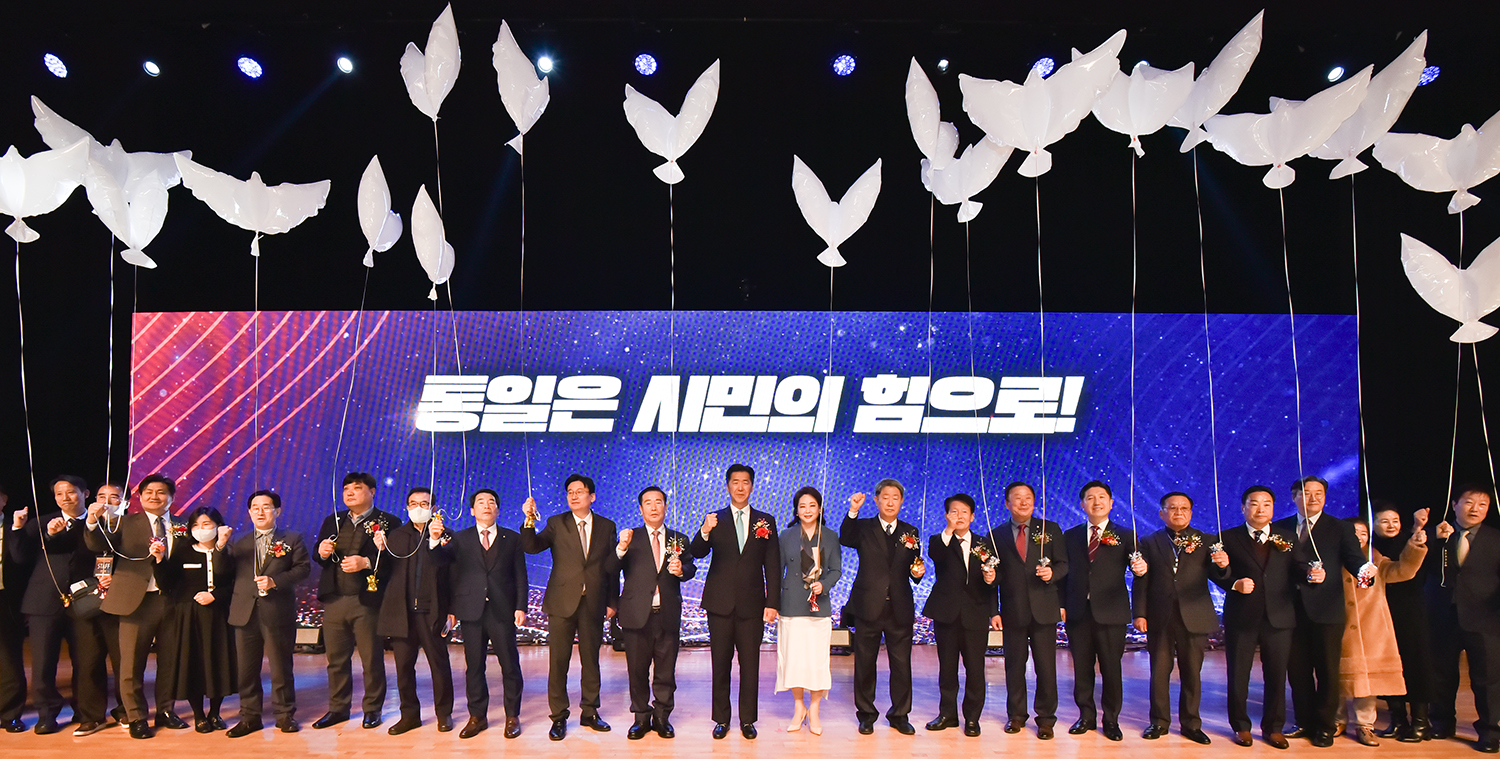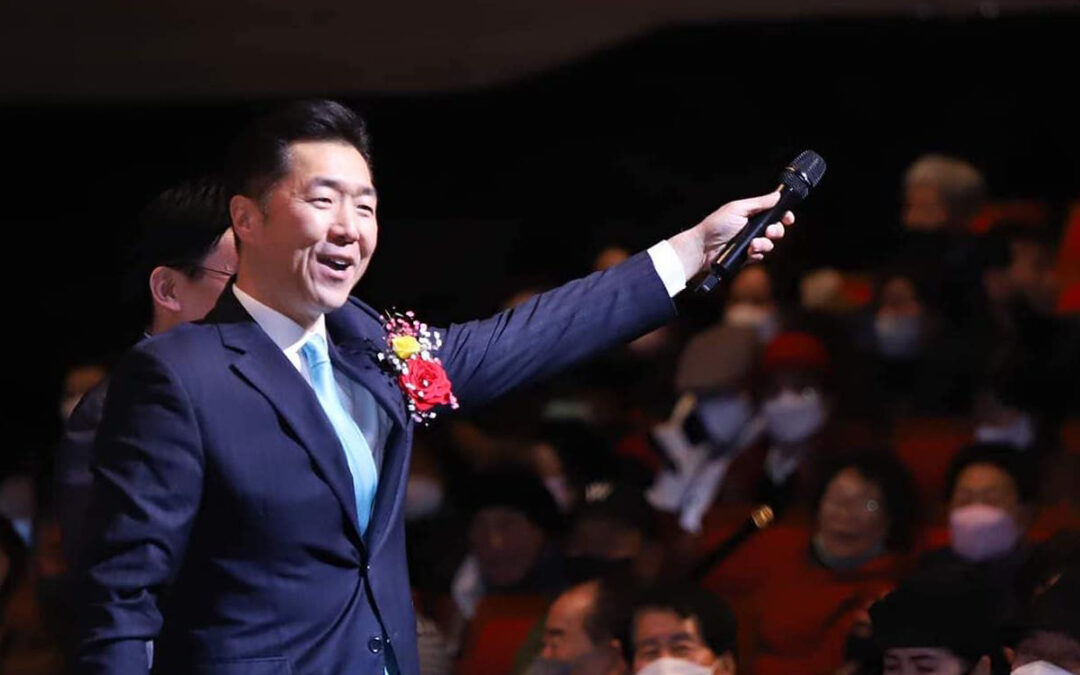At the Action for Korea United Festival on August 15, 2022, twenty thousand Korean citizens pledged to build a grassroots base that would gather 10 million people by 2025 which would mark the 80th anniversary of Liberation Day.
Busan was the first in a series of regional events held throughout Korea to start this work. Thousands gathered in on February 2, 2023 to expand the grassroots, citizen-led movement in the Busan region.
[Korean: Good afternoon! Good afternoon! One more time. The reason I came to Busan is to start a typhoon. Do you want to start a typhoon? [Yes!] I can’t hear you. [Yes!]
I want to thank all of you. I was told that there were patriots that were gathered here. [Korean: Am I right?] If I’m in a room of patriots, then I have to give a message for that audience, do I not?
Would you go on this journey with me, listening carefully to what I speak about, and allow me to use all of the assets in this room, to share with you the content of my message. [Korean: Can you do this?] If you can, the most important thing is ownership. When we talk about a dream, as many of the former speakers mentioned, especially the quote that I often like to use is the quote by Genghis Khan where he said, “If one person has a dream, it is about a dream. But if everyone shares in that dream, it becomes a reality.” That is why this gathering today and this opportunity for me to speak to all of you is about ownership. Because we are going to start a revolution in terms of spirit and heart that can start from this region of Korea and then spread across the peninsula and into rest of Asia and the world. Do you want to be the owner of such a dream?
Before I authored my book, the Korean Dream, there was no such term. There was the American Dream, but there was no Korean Dream. But after I authored that book that touches upon the history of the Korean people and the providential aspiration of our people rooted in Hongik Ingan, that book has influenced not just Korea, but the rest of the world.
If you go to America today and you talk about the Korean Dream, even they will agree with you that is something that “I want to aspire to achieve.” Not just because “I’m not a Korean,” but because “I believe in that dream.” Was there ever a time that a vision that is uniquely Korean has spread and inspired the world, especially in this time of tremendous crisis? [Korean: There wasn’t] – until now. Aju.
[Korean: Now, If you all want to hear from me, you need to learn the word “Aju.”] What does Aju mean?This is a word that my father coined. Remember what I said, “If you want to hear my speech, it’s about ownership.” Aju, basically means, “I will take ownership.” [Korean: I will become an owner.] Meaning it’s not just somebody else’s dream – this is my dream. This is how we are going to bring about a transformation in this nation – that everyone here becomes the owner of this Korean Dream. If that can happen, then like Genghis Khan predicted a millennium ago, “If one person has a dream it is a dream, but if everyone shares in that dream, it becomes a reality,” – that will become a reality.
 So what is the Korean Dream? The Korean Dream starts with the Hongik Ingan ideal, which is a universal aspiration; it’s something that everyone in the world aspires to. Yet, it was never coined as beautifully as by the Korean people. That 5,000 years ago, when most nation-states that were forming only focused on their own self-interest, the Korean people, inspired by a providential mandate, wanted to create a nation not just for itself, but that can be a model to the rest of the world. There is no founding vision of any other civilization in the world that has such lofty goals as the Hongik Ingan ideal of the Korean people.
So what is the Korean Dream? The Korean Dream starts with the Hongik Ingan ideal, which is a universal aspiration; it’s something that everyone in the world aspires to. Yet, it was never coined as beautifully as by the Korean people. That 5,000 years ago, when most nation-states that were forming only focused on their own self-interest, the Korean people, inspired by a providential mandate, wanted to create a nation not just for itself, but that can be a model to the rest of the world. There is no founding vision of any other civilization in the world that has such lofty goals as the Hongik Ingan ideal of the Korean people.
Throughout the entirety of our history, it was this ideal that inspired the Korean people to overcome all of the trials and tribulations that our history ushered us. It was what helped maintain our integrity even though we were conquered and even though we were subjugated. It was a spark that kept the ideal of the independence movement alive, starting with the March 1st 1919 movement and then later on into the movement for independence. 1945 gave us the opportunity to realize that dream.
Yet, instead of realizing that ideal of creating a model, ideal nation that can be the model for all other nations in the world, our nation was divided, swept up in the Cold War era. That will be more than 70-plus years ago today, and we’re still suffering from that division. How many decades have passed, where the dream of unification has slowly withered and died, even in the aspirations of the current Korean people?
When I started the unification movement more than a decade ago, I had the opportunity to speak to all the top-level academics in Washington as well as here in Korea. They all advised me, “Do not start a unification movement.” They told me, “The Korean people don’t want unification.” They told me, “Look at the young people today – all of the demographics suggest and show that they’re not interested in unification. As the aging population ages and the two cultures of North and South becomes more and more distinct, they don’t want unification.” They told me, “Especially young people, because the cost of unification will be their burden, they don’t want unification.”
When I came to Korea and I spoke to all the so-called experts on the unification issue in South Korea, they told me the exact same thing. [Korean: Did I listen to them?] Because I knew something that they and all the statistics did not show. I knew that the destiny of the Korean people is a providential one. What I need to do is re-spark in them the seed of Hongik Ingan that lies within each and every one of our identities. [Korean: If we awaken it, we can. That’s why] I started it anyway, but against the advice of all of the so-called experts.
Two weeks later, Kim Jong-il dies, passes away. And then Kim Jong-un comes into power. Then everybody is interested once again in the possibility of unification. [Korean: You all need to know this well.] We are living in the most consequential moment in the history of the Korean people. This is the moment when that dream of Hongik Ingan can be realized – if and only if –the Korean people can become the owner of that dream. Aju! [Aju!] [Korean: I can’t hear you! Aju!] [Aju!] If you can become an owner, then tremendous things will happen, because history, providential history, is a wind that is pushing our sails. [Korean: You have to become an owner.] You have to re-spark that seed that is within you in terms of your Korean identity.
So basically, I completely re-wrote the book in terms of the unification issue here in Korea, based upon the Korean Dream. First and foremost, when people talked about unification, they looked at it as a dialogue or negotiation between North and South, without any consideration of what the potential outcome might be. I observed this firsthand when my father opened up the door to North Korea in 1991. As my father opened that door, all of South Korea rushed in with all of their own self-centered interests, and whatever collective position South Korea could have in terms of the North, everything was lost.
Learning from this history, I realized that when we talk about unification, you have to have the end in mind. It is not about a dialogue between two parties and then whatever outcome that they negotiate becomes our future reality. No. We have to have the final goal in mind, and those negotiations should be moving unification towards that final goal. So the uniqueness about the Korean Dream is that it focuses on Korean history and Korean identity as the basis of our unification. Is not about one side winning over another side, but it’s about both sides starting all over again to create a new nation that lives according to the ideals of the Hongik Ingan ideal. Aju!
It is about all of the Korean people. Not just here in South Korea, not just in North Korea. All the Korean people, even in the diaspora around the world, that they take ownership over this dream, utilize their foundation, so – collectively – we can build a new nation that lives up to the Hongik Ingan ideal. Aju! [Applause] [Korean: North and South Unification] is not just going to be something that is great for the Korean people. It’s going to be something that will be great for the world. It will be a unification that will bring peace to the most consequential region in the world. It would be the bastion of freedom and fundamental human rights. Where statist autocratic rule is in the rise, it will be a nation that celebrates and champions the idea of God’s sovereignty, the the core of those fundamental freedoms and rights. [Korean: Do you want to make such a nation?] [Korean: Do you want to make such a nation?] [Yes!] [Korean: Do you want to make such a nation?] [Yes!] Oooh.
Maybe I came to the right auditorium today. I don’t want to be speaking to followers, I want to be speaking to leaders. My understanding is each and every one of you is going to be an owner that can be a leader in your community, to spark the Korean Dream, the Hongik Ingan ideal in your neighbors so they can be an owner. So that when we gather once again, this auditorium is several thousand I was told. That it can be increased ten times, 100 times. Can you do that? Yes or no? [Korean: Can you do that?] [Applause.] [Korean: Can you do that?] [Yes!]
That’s why this is so amazing. Can you believe the atmosphere today? When we talk about unification, everybody realizes it’s a foregone conclusion. But a decade ago, nobody believed it was possible. What’s going to happen in the next ten years? If you, you, you, you become an owner of the Korean Dream? [Korean: What will happen? Will unification come? It will come soon.] We have the opportunity, that’s why I’m saying, this is the most consequential moment in the history of our people. That if you can become the owner of the Korean Dream, work together to realize the unification I outlined in my book, then you will have participated in the most consequential moment of the Korean people. That the 5,000 year-old history that was the aspiration of our ancestors and of our forefathers can be realized through us. Aju! [Applause.]
That is why I want you to become an owner. [Korean: Next time we meet, make sure you remember “Aju.”] Because I’m going to say Aju. I want you to say, “Aju!” [Aju!] Aju [Aju!]Aju [Aju!]
”I will become the owner.” Not “He will become an owner,” “She will become an owner.” ”I will become an owner.” Historically, Busan is very significant in the history of our people. This is the gateway to the world. The fact that I came here to speak to all of you in preparation for the [Korean: Ten million person] rally celebrating the 80th year of independence is tremendously significant.
During the Korean War, when the Communist forces came down and pushed this fledgling republic almost off the peninsula, this was the only last foothold. For the first time in the history of humanity, there was an international UN Force that was newly created under the United Nations banner that came here to Korea to fight for the first war of independence. That spirit eventually pushed the North Korean forces all the way to the Yalu River. But of course, it was stopped at the Chinese border.
But there’s a saying, “That ideas are even stronger than armies.” [Korean: Vision is scarier than an army]. So if there’s a vision that can change the geopolitical landscape of this region, which is the most consequential region, what is that vision? Korean Dream. You will hear not only Koreans talking about the Korean Dream, you will hear people around the world talking about the Korean Dream.
[Korean: So if that future comes, is that good?] Do you want that future to come about? [Yes!] [Korean: Do you want it?] [Yes!] [You must become owners. Aju.] [Aju!] So, before I go, I was told that I should speak maybe 20 minutes. I think I already went beyond on 20 minutes. The message that I’m giving is the message the Korean people were waiting for. This is the message that can awaken the latent Hongik Ingan seed that lies in every single one of us –North and South and in the entire diaspora – to realize the Korean Dream of building a model nation.
So, before I go, I was told that I should speak maybe 20 minutes. I think I already went beyond on 20 minutes. The message that I’m giving is the message the Korean people were waiting for. This is the message that can awaken the latent Hongik Ingan seed that lies in every single one of us –North and South and in the entire diaspora – to realize the Korean Dream of building a model nation.
So, I will never leave without giving a challenge. Those of you who want to become the owner of the Korean Dream and basically be a leader in your communities, to spark that seed in your neighbors, stand up. [Korean: Everyone stand up, stand up, and let’s say Aju with both hands raised.] I’m going to ask you a question: Can you become the owner of the Korean Dream? Aju! [Aju!] Aju! [Aju!] Aju! [Aju!]
[Korean: Thank you. Sorry. I’m not finished. Please sit down.] I’m going to leave by singing you a song. I’m not just a stuffy academic. I want to sing a song about dreaming that happened in the most consequential moment in American history. [Korean: Those among you that know Elvis please raise your hand.] Elvis. Then you will know this song. It’s called, “If I Can Dream.” So I’m going to go into the audience and ask you to sing parts of verses. It goes something like this:[Audience member in Korean: Our Chairman Moon Hyun Jin! Victory! Victory!] [Korean: I picked you because I thought you knew this Elvis song but you don’t know it?]“There must be light burning brighter, somewhere.
Got to be birds flying higher in the sky more blue.
If I can dream of a better land, where all my brothers
[Korean: Sing “warmer sun”]Go hand in hand.
Tell me, why, oh why, oh why can’t my dream come true? Oh why?
Got to be peace and understanding sometime.
Strong winds of promise that will blow away your doubts and fears,
if I can dream of a warmer sun
Warmer sun. [Audience member: Warmer sun]
Warmer sun [Audience member: Warmer sun].
[Audience member: Oh why?]Where hope keeps shining on everyone tell me why can’t my dream come true?
Oh, I got to be peace and understanding sometime.
Strong winds of promise that will blow away your doubts and fears,
If I can dream of a brighter sun where hope keeps shining on everyone.
Tell me why. Oh why?
Oh why?
[Audience member: Oh why?]Oh why?
[Audience member: Oh why?] [Korean: please clap for her.] Dream come true? Oh why?We’re lost in a cloud with too much rain,
We’re trapped in a world that’s troubled with pain.
and as long as a man has a strength to dream
He can redeem his soul and fly.
Deep in my heart there’s a trembling question,
Still I am sure that the answer is going to come somehow.
Out there in the dark, there’s a beckoning candle,
Yeah and while I can think, while I can talk, while I can walk, while I can walk
Me and my dream, me and my dream come true.
Right now!! [Audience member: Aju!!] [Korean: Even better! Thank you!]


